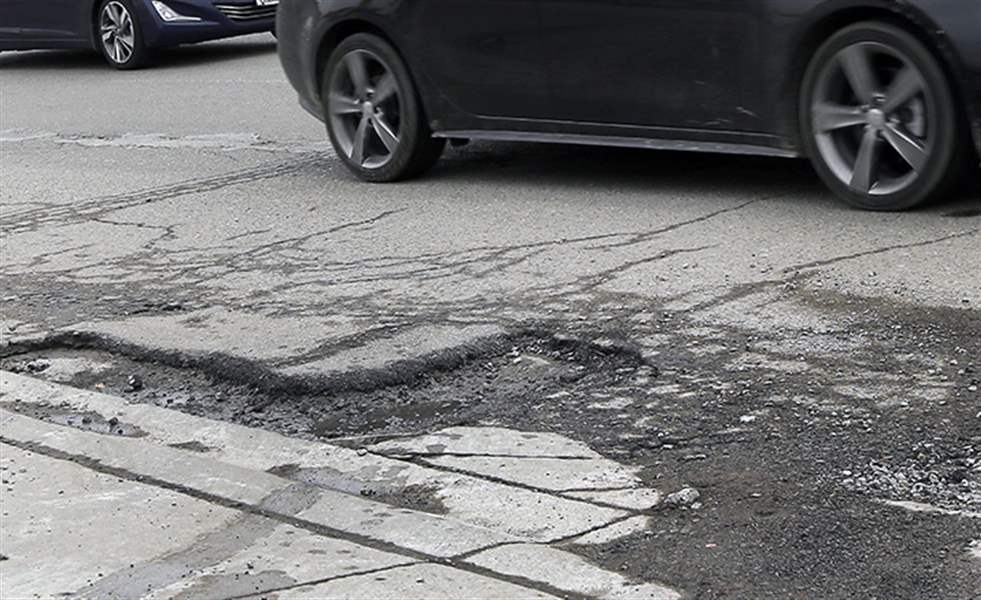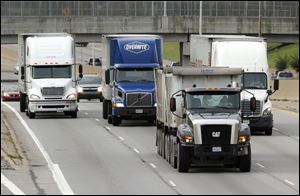
Michigan voters weigh proposal to raise taxes for roadway fixes
4/19/2015
Potholes, such as this one in Detroit, are not an uncommon sight on Michigan’s roadways.
ASSOCIATED PRESS

Potholes, such as this one in Detroit, are not an uncommon sight on Michigan’s roadways.
After years of unresolved wrangling over how Michigan should fund repairs for its crumbling road network, voters will have their say May 5 on a compromise solution that requires an amendment to the Michigan Constitution that raises the state sales tax from 6 percent to 7 percent and triggers a roughly 10-cent-a-gallon tax increase for gasoline and diesel.
The change in Michigan’s tax on motor fuel is not actually part of the constitutional amendment, but legislation enacting it is tied to that amendment, under which gasoline and diesel would no longer be subject to sales tax in a package deal advanced by the Michigan Legislature and Gov. Rick Snyder.
Boosting the state’s gasoline tax from 19 cents per gallon to an initial 41.7 cents per gallon, and its tax on diesel fuel from 15 cents to 46.7 cents per gallon, is expected to generate an additional $1.3 billion annually for road and bridge repairs, while sales-tax collections would increase by a net $795 million even without pump revenue. The current combined value of gasoline and sales taxes at Michigan pumps is about 36 cents per gallon.
“We’ve been underinvesting in Michigan’s infrastructure for decades and, frankly, you can see it now,” Kirk Steudle, director of the Michigan Department of Transportation, said in a video developed by the Snyder administration to promote the plan.
The proposal requires a referendum because Michigan’s sales tax rate is capped at 6 percent by the state constitution, which can only be amended by public vote.
Besides raising the sales tax rate, the amendment would write into the constitution the sales-tax exemption specifically for gasoline and diesel fuel used for highway purposes.
But if voters defeat the amendment, legislation enacting other provisions of the tax plan — including an ongoing change in how the fuel tax is calculated, changes to certain vehicle registration fees, and higher thresholds for Michigan’s earned-income tax credit and homestead exemptions — will be voided.
Polling data
A late-March EPIC-MRA poll of 600 registered voters suggests the proposal is likely to fail.
Sixty-six percent of respondents to the statewide poll conducted by telephone between March 28 and March 30 said they would vote no or were “leaning toward” no if the vote were held the day they were surveyed, while only 24 percent had a favorable leaning.
Roughly the same percentages applied among survey respondents who identified themselves as “very certain May 5 voters.”
Those who responded favorably were most likely — 48 percent — to cite the need for road repairs as the main reason to approve the tax plan, while high taxes, “too much in the proposal,” or wasteful government spending were opponents’ top explanations for their positions.
Time to act?
“Our state budget is over 52 billion dollars! It’s time for our legislators to do their jobs and find the money to fix our roads in billions of dollars they already take from hard working Michiganders every year,” states the web page of Protect MI Taxpayers, organized to oppose the plan.
Its page states the amendment would raise Michigan’s sales tax “to the second highest in the nation,” although that statement overlooks that base sales taxes in many states, including neighboring Ohio, are supplemented by local-option taxes in cities or counties, a practice not allowed in Michigan.
Saferoadsyes.com, a website established by the Michigan Infrastructure and Transportation Association, counters that most of the $52 billion state budget is pass-through federal funds not available to use for transportation, and Michigan has the lowest per-capita spending of any state for roads and bridges.
“This proposal is not perfect — nothing from Lansing ever is,” said the association, a trade group representing the construction industry and affiliated businesses. “But it’s our last chance to fix Michigan’s roads for years, if not decades, and to end the road tax shell game in Lansing.”
Citing state statistics, the nonpartisan Citizens’ Research Council of Michigan noted that since the last Michigan gasoline-tax increase in 1997, revenue from major transportation taxes in the state has been essentially flat, with a slight decline over the past 10 years following a peak in fiscal 2004.
During that time, vehicle fuel economy has risen and the public’s travel mileage has declined, both of which curtailed fuel-tax revenue, the research council said.
But between 2003 and 2014, it said, a national cost index for highway construction has risen by 13.5 percent, and the conditions of both trunkline and nontrunkline highways in Michigan have steadily deteriorated during the past nine years — apparently because of deferred maintenance.
Sales tax issue
One of the long-standing obstacles to resolving Michigan’s road-funding issues, the research council said, is that sales-tax collection at the pump diverts revenue to nontransportation purposes, like the Michigan School Fund, while fuel taxes are dedicated to transportation-related purposes.
The new plan is intended to address that situation, while at the same time raising the sales tax so that schools and others that depend on that source for funding aren’t hurt.
According to another analytical organization, the Mackinac Center for Public Policy, the changes are likely to cost the average Michigan household between $477 and $525 in additional state taxes, not accounting for any share of the increase paid for by out-of-state consumers.
Rough roads
The Road Information Program, a national research nonprofit sponsored primarily by the highway and transit construction and engineering industries, calculated in December that rough roads cost the typical Michigan motorists $539 per year in extra maintenance expense.
That figure rose to $851 in Detroit, where 56 percent of pavements on major streets and highways were reported to be in poor condition.
In future years, Michigan’s fuel taxes would be set by a formula influenced both by wholesale prices during a prior 12-month period and the Detroit consumer-price index, so that increases could occur annually without further legislative action.

Tractor-trailers roll along I-75 in Detroit. If enacted, Michigan’s gasoline tax would increase from 19 cents per gallon to 41.7 cents per gallon. The tax on diesel would increase from 15 cents per gallon to 46.7 cents per gallon.
The Mackinac Center estimated the new fuel tax’s cost for typical Michigan households at between $88 and $136 per year using two different consumption models. It calculated the higher sales tax on other purchases, meanwhile, as having a $389 annual impact on an average household in the state.
A typical household that qualifies for the earned-income tax credit, meanwhile, would pay $69 less in annual state taxes, although some EITC-eligible households might pay more depending on their spending profiles, the Mackinac Center said.
Both it and the Citizens’ Research Council of Michigan noted that the proposed constitutional amendment keeps the sales tax applicable for gasoline and diesel used for nonvehicular purposes, such as fuels for boats, snowmobiles, and lawn mowers.
The Citizens’ Research Council said that provision could present “compliance problems” for the public, because filling stations typically don’t charge for fuel based on its end use, while the Mackinac Center predicted the sales tax on fuel used for off-road purposes would probably go uncollected except for gas pumps at marinas.
The plan also eliminates discounts Michigan now includes in its vehicular registration taxes that apply during the first three years of a new vehicle’s life to mimic its depreciated value.
Owners of large trucks, meanwhile, will face higher registration fees based on their vehicles’ weight, while owners of electric-powered or hybrid vehicles will be assessed registration surcharges varying between $25 and $200 to compensate for fuel tax they don’t pay because their vehicles use less gasoline, if any.
Although Governor Snyder, a Republican, has celebrated the tax proposal as having bipartisan support, he has struggled to maintain party discipline, with many county-level GOP affiliates coming out against it. But as of Friday, neither the Lenawee County nor Monroe County Republican parties had taken a position on the proposal.
Contact David Patch at: dpatch@theblade.com or 419-724-6094.